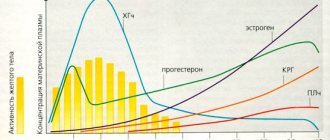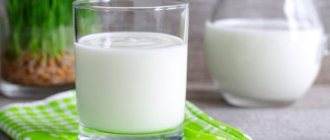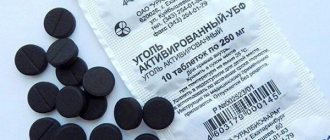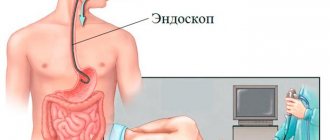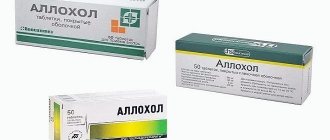Gas formation in the intestines
Each person's gastrointestinal tract contains about 200 ml of gases.
They gradually accumulate, and during the day they come out in the form of farts (flatulence) through the intestine. Gases are formed mainly due to the ingestion of air. This happens during a meal or conversation. Also, certain foods can cause excessive gas formation. That part of it that remains undigested first decomposes and then rots. A certain proportion of complex carbohydrates is not digested and with an abundance of pectin, plant fibers, and cellulose in the intestines, the microflora is disrupted.
As a result, flatulence occurs. The passage of gases with a foul-smelling “aroma” is often accompanied by pain. Other symptoms that cause discomfort may also appear.
Types and classification of the disease
Flatulence, depending on the factors that provoked it, can be divided into:
• Digestive
– develops due to digestive dysfunction: impaired absorption and portal-biliary circulation of bile acids, with food intolerance.
• Nutritional
– occurs due to the consumption of food products, during the assimilation of which a large volume of gases is produced in the intestine.
This food contains a lot of cellulose, coarse fiber, hemicellulose and pectin. • Mechanical
– occurs due to evacuation dysfunction of the gastrointestinal tract, which contributes to impaired movement (adhesions, strictures, neoplasms).
• Dysbiotic
– is the result of a violation of the intestinal microflora.
• Circulatory
– based on the pathology of blood circulation - increased pressure in the portal vein, ischemia of the large intestine, venous stagnation.
• Dynamic
– develops due to disruption of the transit function of the gastrointestinal tract; in this case, there may not be a significant increase in the volume of altered gas, but its movement through the intestinal loops is slowed down.
• High-altitude
– formed when rising to a height, while gases expand and their pressure increases.
• Psychogenic
– intestinal function is disrupted due to stress, hysteria and other mental pathologies.
Flatulence has an acute
and
chronic
course. The acute form of the disease may be an early symptom of peritonitis or be the result of dynamic, paralytic and mechanical intestinal obstruction. A chronic course occurs with aerophagia, it is promoted by neurosis, drinking through a straw, impaired salivation, chewing gum and talking while eating.
Drug treatment
You can often hear from women or men: I fart a lot, I can’t stop, even when I’m close to people, what to do. Naturally, get rid of this problem. After passing the examination, the doctor may prescribe drug therapy, including the following drugs:
- Painkillers: No-shpa, Spazmalgon. Such tablets are not always prescribed. They are used for severe pain or spasm.
- Sorbents: Enterosgel, Enterol, Phosphalugel.
- Enzymes. These are tablets that help activate digestion: Mezim, Creon. They are taken with meals, which improves the person’s condition.
- Affecting intestinal motility: Simethicone.
- Probiotics (if there is an imbalance of harmful and beneficial bacteria in the body).
- Remedy for eliminating excess gas: Cerucal.
- If the problem concerns children of primary preschool age or a newborn baby is suffering, then Espumisan, Babinos will help. But these drugs must be given only with the permission of a doctor and in the prescribed dosage. This medicine can also be taken by pregnant girls and elderly people.
Diagnostics
Usually, an objective medical examination and plain radiography are sufficient to make a diagnosis. When tapping the abdomen, an increase in tympanic sound is noted. Also, to identify the causes of increased gas formation, you may need:
• H2-breathing test (determination of excessive growth of bacteria, hypolactasia); • general tests of stool, blood and urine; • diagnosis of diseases of internal organs (ultrasound, MRI, etc.); • consultation with various specialists (psychiatrist, cardiologist, infectious disease specialist, pulmonologist); • testing the absorption function: test with D-xylose, determination of fat in stool; • microscopy of stool reveals iodophilic flora, many muscle fibers, connective tissue and starch grains.
What to do if foul gas forms
Hydrogen sulfide gas, ammonia and aromatic carbohydrates (skatole, indole, mercaptan) give them an unpleasant stinking odor. Foul gases are formed due to excessive consumption of foods rich in proteins and sulfur.
Mercaptan is produced after the breakdown of methionine. Constant gases in the intestines with a foul odor also appear as a result of a number of diseases, mainly due to disruption of the gastrointestinal tract.
The intensity of the “aroma” depends on the percentage of certain substances in the bubbles. They are produced by a number of bacteria. Therefore, a number of foods are excluded from the diet:
- cabbage;
- meat;
- eggs;
- milk;
- soy;
- fish;
- cereals;
- any carbonated drinks.
The stench is mainly due to hydrogen sulfide, which has the smell of rotten eggs, methanethiol - rotten cabbage. A person’s nose can smell how hydrogen sulfide stinks even in small concentrations, so the sense of smell detects even a small or silent release of gases.
When gas with an odor appears, you need to immediately reconsider your diet. Diet is always the basis for the treatment of flatulence and any gastrointestinal diseases. A properly designed menu helps improve digestion and reduce the release of smelly gases. It is also a good idea to seek advice from a gastroenterologist. If frequent gases with an unpleasant odor appear, an examination is prescribed. Can be assigned:
- colonoscopy;
- blood biochemistry;
- Ultrasound of the peritoneum;
- general blood, urine and stool tests;
- coprogram;
- fibroesophagogastroduodenoscopy.
If the examination reveals pathologies, then treatment will initially be aimed at eliminating the disease. In other cases, it is enough to simply reconsider your diet.
| Types of medications | Titles | Action |
| Antispasmodics | "Spazmol", "No-Shpa" | Eliminate pain, discomfort, relieve spasms. |
| Defoamers | "Infacol", "Espumizan", "Bobotik", "Sab Simplex" | They provoke the rupture of bubbles and the release of gases. |
| Probiotics | "Enterol", "Acipol", "Linex", "Bifikol". | Restores the intestinal microflora, filling it with beneficial microorganisms. |
| Sorbents | “Enterosgel”, “Smecta”, “Polyphepan”, activated carbon. | Absorb toxins and harmful substances and remove them naturally. |
Some medications (more often used for children) are available in the form of suspensions or absorbable tablets. For example, "Motilium", "Motilak".
Diet for gas with a smelly odor
Foul flatulence, or why gas smells so bad, occurs for a variety of reasons. Including due to a number of diseases, which include intolerance to dairy products. Other pathologies that cause foul-smelling gases:
- paresis;
- dysbacteriosis;
- proctitis;
- Crohn's disease;
- worms (helminthiasis);
- intestinal obstruction;
- peptic ulcer;
- intestinal infections;
- constant stress;
- irritable bowel syndrome;
- gastritis;
- pancreatitis;
- peritonitis;
- colitis;
- gastric atony;
- neuroses;
- duodenitis;
- gastroptosis.
According to statistics, in adults, foul-smelling flatulence due to illness appears in 40 percent of cases with pathologies of the digestive tract. Moreover, an excess of gases does not depend on age. For example, in infants, flatulence appears due to an immature digestive system. In older people, the cause of gas formation is an elongated intestine (age-related change).
Another pathology is malabsorption in an adult, when the processes of natural absorption of various substances from foods are disrupted.
To prevent the foul smell of gas, a certain diet is necessary. You should exclude from your diet foods that contain:
- starch;
- fructose;
- pectins;
- sorbitol;
- raffinose.
Goose, pork, mushrooms and other foods that are difficult for the digestive tract lead to the formation of foul-smelling gases. They are not completely processed, the remains begin to rot. Some drinks, such as kvass and alcohol, can also give a gas stench. They significantly enhance fermentation. The following must be excluded from the menu:
- onion;
- grape;
- pears;
- radish;
- canned food;
- baked goods;
- apples;
- bread products;
- cereals (except rice);
- corn;
- pickles;
- legumes;
- sausage;
- cabbage;
- milk and products containing it;
- marinades.
Methods of disposal
With constant farting, the reasons are found out first. This determines whether medications will be used.
It is especially important to conduct an examination if a child is sick. If you are constantly haunted by farting, you can do the following:
- adjust your diet (exclude foods that increase gas formation; make a salad with the addition of parsley, coriander, dill; you can’t always eat egg yolk);
- even if you really want to eat, you should periodically arrange fasting days (if the digestive organs are completely healthy);
- Frequent farting can be stopped with the help of special exercises: massaging the abdomen clockwise, tensing and relaxing the abdominal muscles, retracting and relaxing the spicter muscles;
- After eating, you are allowed to chew anise seeds and drink half a glass of mint, dill or fennel tea.
If a person has to fart more than once in public, and the gases appear with an odor that irritates not only the sense of smell, but also the nerves, this puts him in a very awkward position. Naturally, the problem needs to be solved. If there is severe gas formation in the stomach and farting, it is already clear what to do; you should not let everything take its course.
Symptoms and signs
Flatulence in adults can be putrid
or
fermentative
. These forms are characterized by the following symptoms: diarrhea, alternating with constipation, gases have a sour smell or the smell of hydrogen sulfide, gas formation increases after eating fiber, protein foods, carbohydrates and dairy products, bloating and abdominal pain.
Often with flatulence, symptoms such as belching, heartburn, loss of appetite, nausea, bowel movements and hiccups develop. The clinical manifestations of the disease themselves are due to reasons, of which there are often several, that cause an increased volume of gases in the gastrointestinal tract. Aerophagia is usually combined with intestinal dysfunction - disaccharidase deficiency, IBS, as well as peptic ulcers, neurosis, liver cirrhosis, cholecystitis, pancreatic diseases (pancreatitis) and gastroduodenitis.
After eating, swallowed air accumulates in the stomach, causing a feeling of fullness and rapid saturation, belching of air, pressure and bloating in the epigastric area.
Often the problem of increased gas formation occurs during pregnancy, this is due to the fact that the enlarged uterus presses on the loops of the large intestine, and progesterone produced during this period relaxes the intestines. In severe cases, flatulence can provoke gas colic with spastic pain; in advanced cases, this leads to the threat of termination of pregnancy in women. The most important treatment “in an interesting situation” is normalizing digestion and following a special diet.
During the adaptation of the body to new conditions, a newborn often exhibits digestive problems, expressed in the form of belching, colic and flatulence. In a baby, the causes of increased gas formation may be swallowing air when crying and eating, overeating, introducing new or inappropriate complementary foods, formula milk, or non-compliance with the diet by the mother. In children born prematurely, flatulence is more common. Treatment usually consists of decoctions of cumin, dill, coriander and fennel, massage and warming of the tummy, and the use of rectal catheters.
Flatulence is a fairly common occurrence in dogs. The disease poses a serious threat to the health of the animal, since gastric volvulus, esophageal obstruction, dysfunction of the lungs and venous outflow, and cardiovascular failure can occur. In this case, the animal experiences shock, death occurs within a few hours.


